- Home
- Jennifer Ashley
Scandal and the Duchess
Scandal and the Duchess Read online
Scandal and the Duchess
Jennifer Ashley
InterMix Books, New York
INTERMIX BOOKS
PUBLISHED BY THE PENGUIN GROUP
PENGUIN GROUP (USA) LLC
375 HUDSON STREET, NEW YORK, NEW YORK 10014, USA
USA • Canada • UK • Ireland • Australia • New Zealand • India • South Africa • China
penguin.com
A Penguin Random House Company
This is a work of fiction. Names, characters, places, and incidents either are the product of the author’s imagination or are used fictitiously, and any resemblance to actual persons, living or dead, business establishments, events, or locales is entirely coincidental.
SCANDAL AND THE DUCHESS
An InterMix Book / published by arrangement with the author
PUBLISHING HISTORY
InterMix eBook edition / September 2014
Copyright © 2014 by Jennifer Ashley.
Excerpt from Rules for a Proper Governess copyright © 2014 by Jennifer Ashley.
Penguin supports copyright. Copyright fuels creativity, encourages diverse voices, promotes free speech, and creates a vibrant culture. Thank you for buying an authorized edition of this book and for complying with copyright laws by not reproducing, scanning, or distributing any part of it in any form without permission. You are supporting writers and allowing Penguin to continue to publish books for every reader.
All rights reserved.
No part of this book may be reproduced, scanned, or distributed in any printed or electronic form without permission. Please do not participate in or encourage piracy of copyrighted materials in violation of the author’s rights. Purchase only authorized editions.
For information, address: The Berkley Publishing Group,
a division of Penguin Group (USA) LLC,
375 Hudson Street, New York, New York 10014.
eBook ISBN: 978-1-101-61593-5
INTERMIX
InterMix Books are published by The Berkley Publishing Group
and New American Library, divisions of Penguin Group (USA) LLC,
375 Hudson Street, New York, New York 10014.
INTERMIX® and the “IM” design are registered trademarks of Penguin Group (USA) LLC
Version_1
Contents
Title Page
Copyright
Chapter One
Chapter Two
Chapter Three
Chapter Four
Chapter Five
Chapter Six
Chapter Seven
Chapter Eight
Chapter Nine
Chapter Ten
Chapter Eleven
Chapter Twelve
Chapter Thirteen
Chapter Fourteen
Chapter Fifteen
Epilogue
Sneak Peek at Rules for a Proper Governess
About the Author
Also by Jennifer Ashley
Chapter One
November 1885
When he was this drunk, there was only one thing to do. Steven McBride laid the rest of his money on the table and got unsteadily to his feet.
“Divide it,” he said to the assembled men, his Scots accent slurring. “I cannae see my cards anymore, and you’ll have it off me anyway. Good night.”
His friends and acquaintances, some as drunk as himself, either laughed or grunted and went back to their cards. Bloody Scottish upstart, he knew many of them thought.
Some thought much worse than that—those who knew the story—by their dark looks. Army should have slung him out.
Steven knew exactly why he was imbibing to his eyeballs on his leave, and why he’d come home earlier this year. Knowing why did not make it any easier to leave the card room, navigate his way down the stairs—who the devil had put the card room upstairs?—and stagger into the street.
He looked up and down for his carriage, then remembered he’d hired a carriage to bring him to the soiree tonight. Steven vaguely remembered dismissing it, blast it all, telling the coachman he’d make his own way home.
The November cold was bitter, a wind sweeping down the street to cut straight through Steven’s uniform coat. Steven’s regiment was currently in West Africa, a land of warmth. Bloody great heat, actually, but Africa was an amazing world full of amazing people. Nothing there like this frozen London passage, wind howling down it, stinging him even in his drunken state.
Which way were his lodgings? Steven didn’t have a permanent house in London, so he usually hired rooms whenever he came to town—flats that catered to single gentlemen. He stayed in the same area each time, but rarely in the same house or even the same street. Sometimes he didn’t bother with rooms at all and stayed in a hotel like the Langham.
The Langham—had a familiar ring to it. Was Steven living there now? Or had that been last year?
Steven realized he was standing befuddled in the street, buffeted by the wind. Passersby, what there were of them on this bone-cold night, were looking at him askance.
The pungent, grassy smell of horse dung caught his attention. A carriage clopped slowly by, the horses doing what horses did even when walking about. Wildcats in Africa were cagey about where they relieved themselves, hiding it from all but the most canny hunters. London horses simply let it fall to the street, and humans came along behind and swept it up for them. Which animal was the more clever?
Steven half jogged, half stumbled toward the carriage. A hansom, that’s what he needed. He could tell the cabby to take him to the Langham, where they’d find him a room, whether he’d booked in already or not.
The shape was wrong for a hansom, but Steven was past caring. He had to get somewhere, or he’d fall down in the street and spend the rest of the night unconscious on the cobbles. Even in this part of London, even in this weather, he doubted he’d have much left on him when he woke up.
The carriage stopped. Wind cut Steven, making his eyes water. He folded his arms against the cold, and ran toward the carriage, head down.
A woman bundled in a thick cloak and hood came out of the lighted house the carriage had halted before. As soon as she crossed the threshold, four or five other persons appeared out of nowhere to block her way.
“There she is!”
“Duchess . . . Your Grace . . .”
“Your Grace, my readers would love a description of your gown tonight . . . Are you still in mourning?”
“Your Grace, how did it feel to have ensnared a duke, only to have him perish in the wedding bed?”
“Your Grace, there are rumors of you carrying on a flirtation with the Earl of Posenby. Or his son. Some speculate both. Would you tell us which it is?”
Bloody journalists, Steven thought in disgust. They were after some aristo, more dirt for the scandal sheets. Steven had no idea who the cloaked woman was and had no interest. He only wanted to climb into the carriage—private or not, he’d pay the coachman handsomely to take him anywhere.
Of course, he’d just thunked a large wad of money to the game table. Steven wondered vaguely if he had any left as he made a lunge for the coach.
The cloaked woman broke from the vultures—“Your Grace, is it true you’re wintering in Nice with a comte?”
She put on a burst of speed. Steven stumbled on his drunken feet, and he and the woman met in a crash of flesh and breathlessness.
Steven found himself landing face-first on a bosom of exceptional quality. The woman’s cloak had pulled away, revealing a gown fairly modestly cut but giving Steven enough bosom to enjoy. His cheek rested on warm flesh, his lips pressed onyx beads, and he inhaled a heady, womanly perfume.
He heard a heart beating rapidly under his ear, and a voice vibratin
g through a body of fine plumpness.
“Oh dear.”
Steven tried to raise his head—not that he wanted to—but he couldn’t. He could only lever himself up by grasping the woman by the hips and pulling himself upright.
The hips were a warm handful, the thighs beneath her skirts and stiff bustle even better. Steven climbed the poor woman, unbending himself as he went.
Unfortunately, his legs had stopped working. They gave way again, throwing his weight onto her. She retreated to compensate, but her back met the carriage door. Steven kept falling, his body landing full-length against hers, plastering her to the coach.
The woman’s hood slipped down. Steven saw eyes of clearest green, a round face haloed by golden hair, flushed cheeks, and a wide mouth that begged for kisses. It would be rude to kiss her without asking first, but Steven didn’t have the words to inquire.
His face and hers were very close together, the kissable lips an inch away.
“My dear fellow,” the woman said breathlessly. “Are you all right?”
“No,” Steven tried to say. “Damn, woman, but you’re beautiful.” The words came out a jumbled mess, in broad Highland Scots, but the journalists heard them.
“Your Grace, who is he?” “A regimental affair, is it? Or a Highland fling?” “What about the comte? And the earl?”
“Good Lord,” came the impatient voice of Steven’s angel. “Leave the poor man alone. Can’t you see he’s ill?”
“Falling down drunk is more like it,” one of the journalists said, and laughed. “Who is he? Give us a name.”
“You lot, clear off!”
The coachman had come down off the box, and flapped his hands at the journalists like a woman shooing chickens out of her garden. Steven wanted to burst out laughing. At the same time, a footman exited the house from which the woman had emerged and laid hands on Steven. Steven heard the cry of a constable coming up the street, along with the man’s heavy footsteps.
“Off with you,” the footman growled at Steven. The constable came faster, his tall helmet bobbing out of the gloom and making Steven laugh harder.
Laughter and the footman’s heavy hands made Steven slide down the woman’s body. He found the hard street beneath his knees, his face buried in her abdomen, the black bombazine of her gown smooth against his nose.
She smelled wonderful. The perfume didn’t come from a bottle. It was her—soap and the scent of fabric, warmth and woman. Steven pressed a his face to her belly, wanting to take his ease with her.
“Sir.” Her hands were on his hair. Steven snuggled in closer. If they’d been alone and without so many clothes, this would be the perfect way to finish the night.
She leaned to him, his angel, and whispered, “What on earth are you doing?”
“Loving you,” Steven said. “You deserve every bit of loving a man can give you.”
“Oh,” she said. “You are very drunk, I believe. Perhaps the nice constable will see you home.”
“No home.” His home was a tent in Africa, under huge sky, in blessed warmth. “I have no home.”
“Dear me, that’s sad. Do you need money? Perhaps a meal?”
Steven’s laughter returned. She thought him a homeless, helpless sot, and maybe he was.
The journalists surged forward. More people seemed to be on the street, and someone threw a stone. “Tart!” a woman yelled. “Be off with ye.”
The coachman growled. He flung open the door of the coach and more or less hoisted the woman inside. Steven grabbed the door as it swung shut, hanging on to it to keep him upright. The coachman started to wrench him away, but the journalists pushed in, as did the sudden crowd. London loved a riot—best way to keep warm in the winter, Steven mused—any excuse to begin one.
“Miles, let him in. He’ll get trampled.”
Steven heard her voice, felt himself be hauled up under the arms by a man of amazing strength, and then he met the floor of the carriage. The door slammed, bumping Steven’s booted foot. After a moment, the carriage jerked forward, and things splattered against it—the denizens making good use of the handy horse apples in the street.
The angel seemed to be speaking to him. Steven heard her clear voice but no words. He laid his head on her skirt, blissfully warm, and drifted off to sleep.
***
When Steven cracked open his eyes, it was daylight; at least as much daylight that could filter through the narrow, dirty window on a London winter day.
The narrow window went with the narrow room, wide enough only for a single bed and a corner washstand. That was all. No curtain or blind, no bureau, no cheerful fire, only a brick chimney that went up through the room and gave off a modicum of heat.
Where the hell was he? The last thing Steven remembered was a card game . . .
No, a cold London street, someone throwing things . . .
Green eyes, red lips curving into a little smile, and a scent like roses. Deep red roses, heady and intense.
Had Steven dreamed her? If so, he wanted to go back to sleep.
But the cold, Steven’s pounding head, and details of the night were knocking for attention. He should climb out of bed, dress, and face his problems like a Scotsman and a soldier.
The bed was warm, and raising his head hurt like hell. Steven laid it back down.
He must have slept again, because when he opened his eyes again, the room was brighter. The door swung open, and in came his angel with a wooden tray heaped with crockery.
“Good morning,” she said brightly. “Would you like some tea?”
Chapter Two
The unknown man stared at her over the bedcovers with bloodshot, sunken eyes, and a face covered with stubble. Rose reminded herself he was a pathetic creature, a war veteran, likely in need of charity.
The former soldiers she’d seen eking out a living on the streets weren’t nearly as handsome as this one, though. Winter sunlight burnished his short hair golden, his whiskers too. His hard face was the bronze color of someone who’d spent time in a climate hotter than England’s. Rose had thought him older on the street, but she could see now that he was a fairly young man, battered and suntanned from his profession.
The man’s eyes, other than being bloodshot, were a profound gray. He pinned her with that gray gaze as though she were an enemy soldier, not a kind young woman come to bring him breakfast.
“They called you duchess,” he said in a voice strong despite his obvious hangover.
“Briefly,” Rose said, carrying the tray toward him. The tray had small legs and was designed to go over the breakfaster’s lap, much like one her mother had owned. The lady of the house always took breakfast in bed, her mother had told the child Rose, the privilege of a wife. What had become of that tray Rose sadly didn’t know. “I was Duchess of Southdown,” Rose said. “Still am, really—the dowager duchess now. What do they call you?”
The man ignored her question, his gaze becoming more focused. “What I mean is, if you’re a duchess, why are you carrying trays to hungover officers in your garret? If this is a garret. Where the devil am I?”
He had a pleasant Scots accent and a nice rumbling baritone to go with it. A lady could listen to his voice all day and not tire of it.
“This is Miles’s house,” Rose said. “He didn’t know where else to bring you. Or me. Miles is my coachman. Well, he was my coachman. I’m staying with him at the moment.”
“Your coachman.”
“That’s right.” Rose gave him an encouraging smile. “Now I have tea here, and plenty of toast with jam and butter, and a bit of sausage. Mrs. Miles makes a wonderful breakfast. Perhaps Miles can find a few odd jobs for you to do for a bit of coin before you go. Would you like that?”
The man’s look turned to a glare—perhaps Rose shouldn’t have mentioned the work; his pride was obviously intact. He didn’t soften his gaze, but he struggled to sit up, his nostrils widening at the scent of the hot food. He was hungry, poor lamb.
The man’s bare tor
so emerged from the blankets, and Rose swallowed and tightened her hold on the tray. His shoulders and chest were broad and sunbaked, his chest dusted with golden curls. The hard planes of his torso made her remember him falling against her, how she’d felt the steel of muscle beneath his soiled uniform coat.
This man had honed his body, had fought with it, if the scarred fingers, healed from breaks, told her anything. She could imagine women running their fingers down his chest, finding the hollows and planes of it, touching the dark areola that slid above the sheet.
The man saw her gaze and tucked the sheet under his arms, hiding most of his chest. But he didn’t stammer or apologize for his nakedness in front of a lady, nor did he try to burrow back under the bedclothes. He simply reached for the tray that she’d frozen to, pried it out of her hands, and settled it across his lap.
“Where are my clothes?” he demanded.
“Pardon?” Rose blinked, tearing her gaze from the play of his thick-muscled arms as he uncovered the toast and poured tea.
“Clothes,” he repeated. “I’m not wearing any. Where are they?”
The bareness of him went all the way down, Rose realized. She clenched her hands, since she didn’t have anything else to hold. “Miles took your uniform away to be cleaned. It was dirty from the streets.”
“London streets will do that.” The man took a long drink of tea, and another, and another. The liquid had to be scalding, but he gulped it down and poured another cup. “You still haven’t told me why a duchess is living with her coachman,” the man said, lifting the first piece of toast. “And her coachman’s wife.” He put away the half slice in two bites and reached for another.
“I’m a duchess, because I married a duke,” Rose said. “I was plain Miss Barclay before that, but my family is all gone now.” The sorrow of that tore at her, and it always would. “I’m stopping with my coachman, because I’m skint. I had been staying with a friend, but she asked me to leave last night—or, rather, hinted strongly that I should go. Can’t blame her, really. Journalists follow me about, waiting for me to do something scandalous, which happens all the time, unfortunately. I’m telling you this to warn you, because I’m certain the story of you coming home with me is all over London this morning. If you keep your head down, I think you’ll be all right.”

 Grant
Grant Pride Mates
Pride Mates The Duke's Perfect Wife
The Duke's Perfect Wife Scandal Above Stairs
Scandal Above Stairs White Tiger
White Tiger Midnight Wolf
Midnight Wolf Rules for a Proper Governess
Rules for a Proper Governess Wild Wolf
Wild Wolf Bad Wolf
Bad Wolf Lion Eyes
Lion Eyes Murder in Grosvenor Square
Murder in Grosvenor Square The Untamed MacKenzie
The Untamed MacKenzie Wicked Deeds of Daniel Mackenzie
Wicked Deeds of Daniel Mackenzie Tiger Striped_Shifters Unbound
Tiger Striped_Shifters Unbound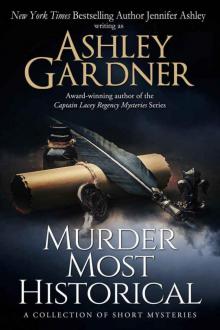 Murder Most Historical
Murder Most Historical Shifter Made
Shifter Made Mate Bond
Mate Bond Tiger Striped
Tiger Striped Bodyguard
Bodyguard Guardian's Mate
Guardian's Mate From Jennifer Ashley, With Love
From Jennifer Ashley, With Love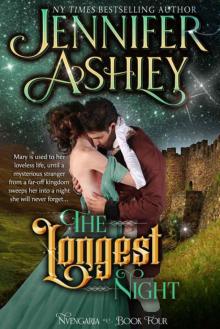 The Longest Night
The Longest Night The Stolen Mackenzie Bride
The Stolen Mackenzie Bride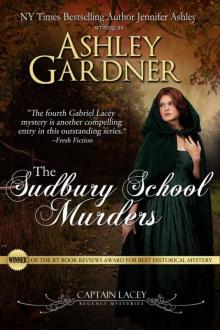 The Sudbury School Murders
The Sudbury School Murders The Care & Feeding of Pirates
The Care & Feeding of Pirates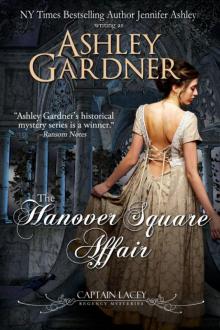 The Hanover Square Affair
The Hanover Square Affair Death Below Stairs
Death Below Stairs Wild Things
Wild Things Wild Cat
Wild Cat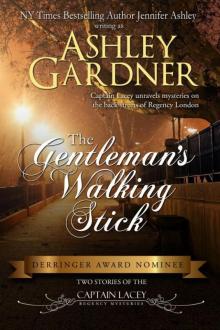 The Gentleman's Walking Stick
The Gentleman's Walking Stick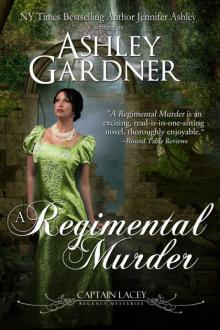 A Regimental Murder
A Regimental Murder Lone Wolf
Lone Wolf Forbidden Taste
Forbidden Taste Red Wolf
Red Wolf The Madness of Lord Ian Mackenzie
The Madness of Lord Ian Mackenzie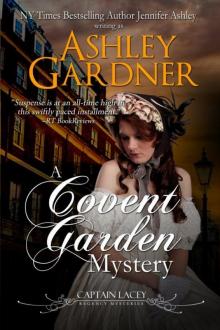 A Covent Garden Mystery
A Covent Garden Mystery The Pirate Next Door
The Pirate Next Door Past Crimes: A Compendium of Historical Mysteries
Past Crimes: A Compendium of Historical Mysteries Highlander Ever After
Highlander Ever After The Alexandria Affair
The Alexandria Affair A Shifter Christmas Carol
A Shifter Christmas Carol The Devilish Lord Will
The Devilish Lord Will Adam
Adam Kyle (Riding Hard Book 6)
Kyle (Riding Hard Book 6) A Body in Berkeley Square
A Body in Berkeley Square The Mad, Bad Duke
The Mad, Bad Duke Mate Claimed
Mate Claimed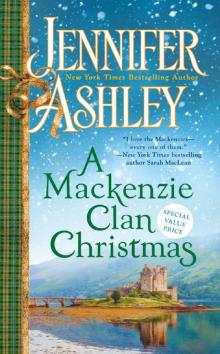 A Mackenzie Clan Christmas
A Mackenzie Clan Christmas The Seduction of Elliot McBride
The Seduction of Elliot McBride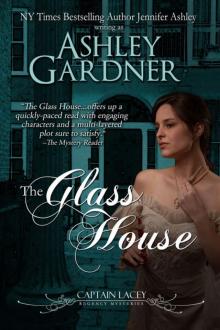 The Glass House
The Glass House Iron Master (Shifters Unbound Book 12)
Iron Master (Shifters Unbound Book 12) A Mackenzie Family Christmas: The Perfect Gift
A Mackenzie Family Christmas: The Perfect Gift Scandal Above Stairs_A Below Stairs Mystery
Scandal Above Stairs_A Below Stairs Mystery Perfect Mate
Perfect Mate Murder in the East End
Murder in the East End Snowbound in Starlight Bend
Snowbound in Starlight Bend Hard Mated
Hard Mated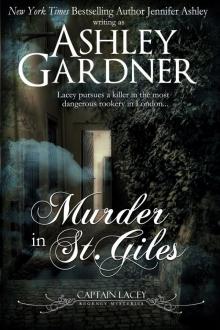 Murder in St. Giles
Murder in St. Giles Alec Mackenzie's Art of Seduction
Alec Mackenzie's Art of Seduction A MacKenzie Clan Gathering
A MacKenzie Clan Gathering Tyler
Tyler Lady Isabella's Scandalous Marriage
Lady Isabella's Scandalous Marriage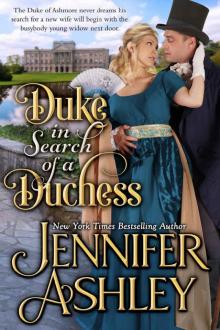 Duke in Search of a Duchess: Sweet Regency Romance
Duke in Search of a Duchess: Sweet Regency Romance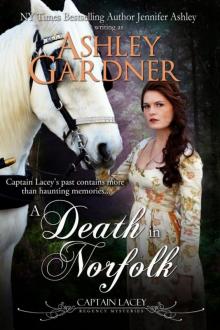 A Death in Norfolk
A Death in Norfolk Give Me One Night (McLaughlin Brothers Book 4)
Give Me One Night (McLaughlin Brothers Book 4) Iron Master
Iron Master The Many Sins of Lord Cameron
The Many Sins of Lord Cameron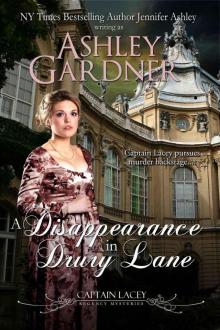 A Disappearance in Drury Lane
A Disappearance in Drury Lane Never Say Never (McLaughlin Brothers Book 3)
Never Say Never (McLaughlin Brothers Book 3) Death in Kew Gardens
Death in Kew Gardens Ross: Riding Hard, Book 5
Ross: Riding Hard, Book 5 Ray: Riding Hard
Ray: Riding Hard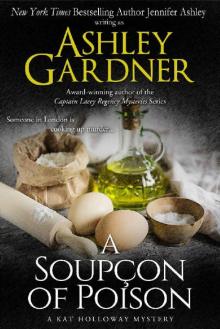 A Soupçon of Poison
A Soupçon of Poison Tiger Magic
Tiger Magic The Pirate Hunter's Lady
The Pirate Hunter's Lady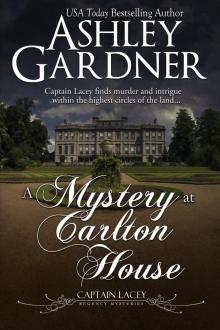 A Mystery at Carlton House
A Mystery at Carlton House The Necklace Affair
The Necklace Affair Wolf Hunt
Wolf Hunt Scandal and the Duchess
Scandal and the Duchess Kyle
Kyle Why Don't You Stay? ... Forever (McLaughlin Brothers Book 2)
Why Don't You Stay? ... Forever (McLaughlin Brothers Book 2) Bear Attraction
Bear Attraction The Gathering
The Gathering A Mackenzie Yuletide
A Mackenzie Yuletide Wild Things (Shifters Unbound #7.75)
Wild Things (Shifters Unbound #7.75) The Redeeming
The Redeeming The Seduction of Elliot McBride hp-5
The Seduction of Elliot McBride hp-5 Death at the Crystal Palace
Death at the Crystal Palace Mackenzie Family Christmas: The Perfect Gift (highland pleasures)
Mackenzie Family Christmas: The Perfect Gift (highland pleasures) Forbidden Taste: A Vampire Romance (Immortals)
Forbidden Taste: A Vampire Romance (Immortals) Care and Feeding of Pirates
Care and Feeding of Pirates Shifter Made (shifters unbound)
Shifter Made (shifters unbound) Dark and Dangerous: Six-in-One Hot Paranormal Romances
Dark and Dangerous: Six-in-One Hot Paranormal Romances The Duke’s Perfect Wife hp-4
The Duke’s Perfect Wife hp-4 The Seduction of Elliot McBride (Mackenzies Series)
The Seduction of Elliot McBride (Mackenzies Series) Lady Isabella's Scandalous Marriage hp-2
Lady Isabella's Scandalous Marriage hp-2 BodyGuard (Butterscotch Martini Shots Book 2)
BodyGuard (Butterscotch Martini Shots Book 2) The Wicked Deeds of Daniel Mackenzie hp-6
The Wicked Deeds of Daniel Mackenzie hp-6 Tiger Magic su-5
Tiger Magic su-5 The Madness Of Lord Ian Mackenzie hp-1
The Madness Of Lord Ian Mackenzie hp-1 Alec Mackenzie's Art of Seduction: Mackenzies (Mackenzies Series Book 9)
Alec Mackenzie's Art of Seduction: Mackenzies (Mackenzies Series Book 9) Mackenzie Family Christmas: The Perfect Gift
Mackenzie Family Christmas: The Perfect Gift Bodyguard (Shifters Unbound #2.5)
Bodyguard (Shifters Unbound #2.5) Midnight Wolf (A Shifters Unbound Novel)
Midnight Wolf (A Shifters Unbound Novel) White Tiger (A Shifter's Unbound Novel)
White Tiger (A Shifter's Unbound Novel) Cowboys Last All Night
Cowboys Last All Night Pride Mates su-1
Pride Mates su-1 Hard Mated (shifters unbound )
Hard Mated (shifters unbound ) Bodyguard (shifters unbound )
Bodyguard (shifters unbound ) Snowbound in Starlight Bend: A Riding Hard Novella
Snowbound in Starlight Bend: A Riding Hard Novella The Untamed Mackenzie (highland pleasures)
The Untamed Mackenzie (highland pleasures) The Untamed Mackenzie (Mackenzies Series)
The Untamed Mackenzie (Mackenzies Series)![Highland Pleasures [6] The Wicked Deeds of Daniel Mackenzie Read online](http://i1.bookreadfree.com/i2/04/07/highland_pleasures_6_the_wicked_deeds_of_daniel_mackenzie_preview.jpg) Highland Pleasures [6] The Wicked Deeds of Daniel Mackenzie
Highland Pleasures [6] The Wicked Deeds of Daniel Mackenzie Lone Wolf (shifters unbound)
Lone Wolf (shifters unbound)![Shifters Unbound [5] Tiger Magic Read online](http://i1.bookreadfree.com/i2/04/11/shifters_unbound_5_tiger_magic_preview.jpg) Shifters Unbound [5] Tiger Magic
Shifters Unbound [5] Tiger Magic Tyler (Riding Hard Book 4)
Tyler (Riding Hard Book 4) Ross
Ross Bad Boys of the Night: Eight Sizzling Paranormal Romances: Paranormal Romance Boxed Set
Bad Boys of the Night: Eight Sizzling Paranormal Romances: Paranormal Romance Boxed Set From Jennifer Ashley, With Love: Three Paranormal Romances from Bestselling Series
From Jennifer Ashley, With Love: Three Paranormal Romances from Bestselling Series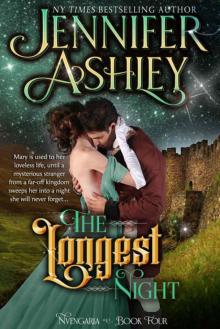 The Longest Night: Fantasy Romance (Nvengaria Book 4)
The Longest Night: Fantasy Romance (Nvengaria Book 4) The Many Sins of Lord Cameron hp-3
The Many Sins of Lord Cameron hp-3 Mate Claimed su-4
Mate Claimed su-4